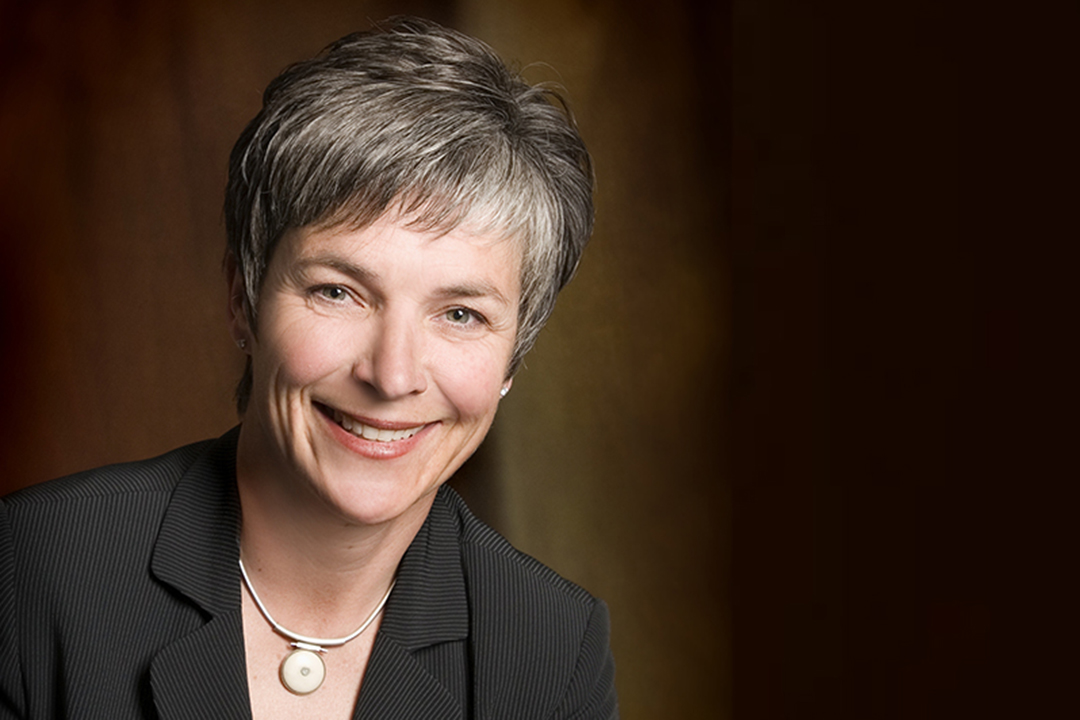
Prairie vet: ‘I can’t think of a better profession’
Dr. Julie de Moissac couldn’t be happier with her lifestyle and work environment as the sole veterinarian at her practice near Outlook, Sask.
By Lynne GunvilleHer original career plan had been occupational therapy, but she realized after a year of training that she wanted to delve more deeply into medicine and the sciences. That’s when she switched to Plan B.
“I knew I wasn’t interested in living in a city and working indoors all the time,” de Moissac recalls. “When I checked my options, veterinary medicine seemed to fit what I wanted to do and where I wanted to live and work.”
From the time she entered the Western College of Veterinary Medicine (WCVM), de Moissac knew she’d made the right choice. Years later she still feels a special bond with her classmates as well as clinical interns and residents that she met through the college.
“The veterinary profession is quite small, and we’re pretty tight. It’s just like family,” says de Moissac. “And that veterinary school experience is firmly etched on everyone’s brain. It’s an incredible bond.”
After graduation in 1986, de Moissac spent three years at a mixed practice in Outlook before moving farther out of town to open her own practice, Bratton Road Veterinary Holdings Professional Corporation — a small animal clinic and ambulatory practice.
Having grown up on a mixed farm near Biggar, Sask., de Moissac is familiar with farming and the rural lifestyle, and she enjoys that half of her practice involves driving to farms and working with beef cattle in the area.
“What a great job! I really love client contact, and I get to drive around and visit with people that I’ve known for decades,” says de Moissac. “It’s just a really nice sense of community and being a professional that people can call up whenever they have questions about their animals or even other things as well.”
De Moissac also enjoys being part of the veterinary community. As past president of both the Saskatchewan Veterinary Medical Association and the Canadian Veterinary Medical Association (CVMA), she’s been a dedicated advocate for her profession.
She’s particularly proud of her work with the CVMA and initiatives such as the one that established a Canadian reserve of veterinarians for extra emergency support during disease outbreaks. During her 2009 term as CVMA president, de Moissac travelled extensively and was impressed by the efforts of veterinarians she met while representing the organization across North America.
“It was the highlight of my professional career and a huge learning curve,” de Moissac says. “There are a lot of good people doing great things. As a member services group, we are the voice of veterinarians across the nation, and the involvement of veterinarians as an advisory group with government is becoming more and more crucial.”
De Moissac continues to work for her veterinary community by serving on the board of directors for Prairie Diagnostic Services, Saskatchewan’s provincial veterinary laboratory, and by being part of college site accreditation teams for the American Veterinary Medical Association’s Council on Education.
She’s grateful for the WCVM and the support it provides for rural practices such as hers, citing the college’s referral services as well as its diagnostic capabilities. De Moissac emphasizes the importance of the college’s Disease Investigation Unit headed by Dr. John Campbell — an invaluable resource for difficult herd cases.
“Without the WCVM, I’d be scrambling. For all of my referrals I’ve been so appreciative of the work that they do and the reports they send to me. The communication is seamless, and my clients are very happy with the service they get.”
De Moissac adds that it’s vital for the WCVM to remain strong and to continue training a diverse mixture of students. She points to the increased demand for veterinary services, particularly with small animals where people want more services as the bond between them and their companion animals grows stronger.
“We are crucial for animal health, animal welfare and food safety,” de Moissac says. “For the food animal industry, we are that crucial piece of the puzzle for animal and health welfare, and as far as companion animals, … we’ve become the new family doctor because pets are family.”
She has also been active in the Outlook community, particularly when her two daughters were younger. Both girls have now left home to study at the University of Saskatchewan.
De Moissac and her husband enjoy living on an acreage with their rescue border collie Whiskey and leading an active lifestyle that includes hiking, cycling and canoeing — they’ve canoed many of the rivers in northern Saskatchewan.
When de Moissac reflects on her veterinary career, she is most satisfied by the people that she’s dealt with over the years, and she appreciates that her job still gives her the chance to learn something new every day.
“There are challenges and sometimes disappointments, but I can’t think of a better profession,” says de Moissac. “And I get to be a hero. I get to work with clients who trust me, and sometimes I don’t get to fix things — but I can at least comfort and help.”